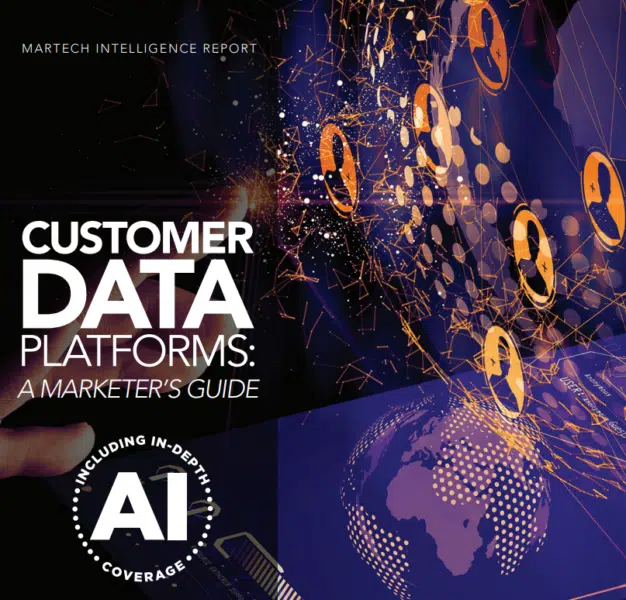AI-powered features to look for in customer data platforms
While CDPs have long had AI "behind the scenes," the integration of genAI is spurring vendors to add many new features and abilities.
At a time when uncertainty about everything from war to global warming to economics dominates the headlines, the customer data platform is increasingly seen as one of the must-have elements of the martech stack. Meanwhile, the boom in artificial intelligence and machine learning is driving vendors to enhance the capabilities of these platforms, making the value proposition even more attractive.
One factor driving this trend is the increasing importance of customer experience (CX), which is improved through timely data gathering, AI-assisted segmentation and the personalization of interactions. Fully 75% of global 100 organizations say CX is a top priority, according to Forrester Research.
Incorporating AI can make personalization even more powerful, enabling marketers to identify lucrative segments and deliver content tailored for those individuals. Content personalization is currently the purpose for which most organizations are utilizing AI, according to the PwC CMO Survey, Fall 2023.
Looking to take control of your data? Learn about trends and capabilities of customer data platforms in the latest edition of this MarTech Intelligence Report.

AI availability varies widely
The extent to which this functionality and other AI and ML capabilities are integrated into today’s CDPs varies widely. Although predictive AI and machine learning have long been utilized by CDP vendors, the boom in generative AI, and the accompanying marketer adoption, are leading to more and splashier integrations.
This makes a lot of sense, given that these technologies are enhanced by the utilization of vast amounts of data, and CDPs serve as the center for that type of data within the enterprise.
Many of the uses of AI and machine learning in CDPs happen behind the scenes, where vendors use sophisticated models to cleanse and normalize data, to surface audiences based on their likelihood to respond to a particular offer, and to drive attribution models and testing.
GenAI still being explored
When it comes to generative AI, CDPs are still in the early stages of exploring how it can enhance their offerings. Based on our discussions with vendors, we expect to see more innovation in this arena in the coming years.
Some vendors are already offering chat interfaces that allow marketers to ask questions of the CDP data in natural language, with responses provided both in text and in data visualizations. Others are implementing natural language interfaces to improve usability and reduce the steps necessary for users to accomplish a goal. Additionally, some campaign-oriented platforms are integrating content creation via large language models (LLMs) for image or text generation, to be used to develop ad campaign creative or email marketing messaging.
Dig deeper: 3 points to consider before implementing a CDP
CDP vendors offer data analytics capabilities that can do some or all of the following: allow marketing end-users to define and create customer segments, track customers across channels and glean insights into customer interest and intent from customer behavior and trends. Many of these features are now being upgraded with AI and ML.
Features to look for
The availability and sophistication of these features can vary significantly based on the CDP vendor and the specific product offering. Here are some of the common use cases:
- Enhanced customer insights and predictive analytics: These are fairly common features in modern CDPs. Most advanced platforms utilize ML algorithms for deeper customer insights and predictive analytics, aiding in customer segmentation and behavior prediction.
- Real-time data processing: Real-time processing is a key feature of many CDPs, particularly those targeting larger enterprises or businesses with dynamic, fast-paced marketing environments.
- Personalization at scale: This feature, enabled by real-time data processing, is widely sought after, and many CDPs offer robust personalization capabilities powered by AI. The degree of personalization can vary, with more sophisticated systems providing highly tailored content and recommendations.
- Automated decision-making: Automation in decision-making, especially for routine marketing tasks, is increasingly common in CDPs. This includes automated campaign management, content optimization and customer interaction timing.
- Data quality management: Most CDPs offer some level of data management and cleaning, but the extent of AI involvement in this process varies. Advanced platforms may use more sophisticated AI algorithms for data quality assurance.
- Generative AI for content creation: This is less common and is typically found in more cutting-edge or specialized CDPs. The use of generative AI for content creation is an emerging trend and not yet a standard feature in CDPs.
- Sentiment analysis and social listening: These capabilities are increasingly incorporated into CDPs, especially those designed for comprehensive digital marketing strategies that include social media.
- Anomaly detection: While becoming more prevalent, anomaly detection using ML is not yet a universal feature across all CDPs. It’s more commonly found in platforms that emphasize security and data integrity.
Download the updated 2024 buyer’s guide for Customer Data Platforms
When choosing a CDP, it’s essential to assess which AI and ML capabilities are most relevant to your business needs so that you can evaluate potential platforms accordingly.
Related stories